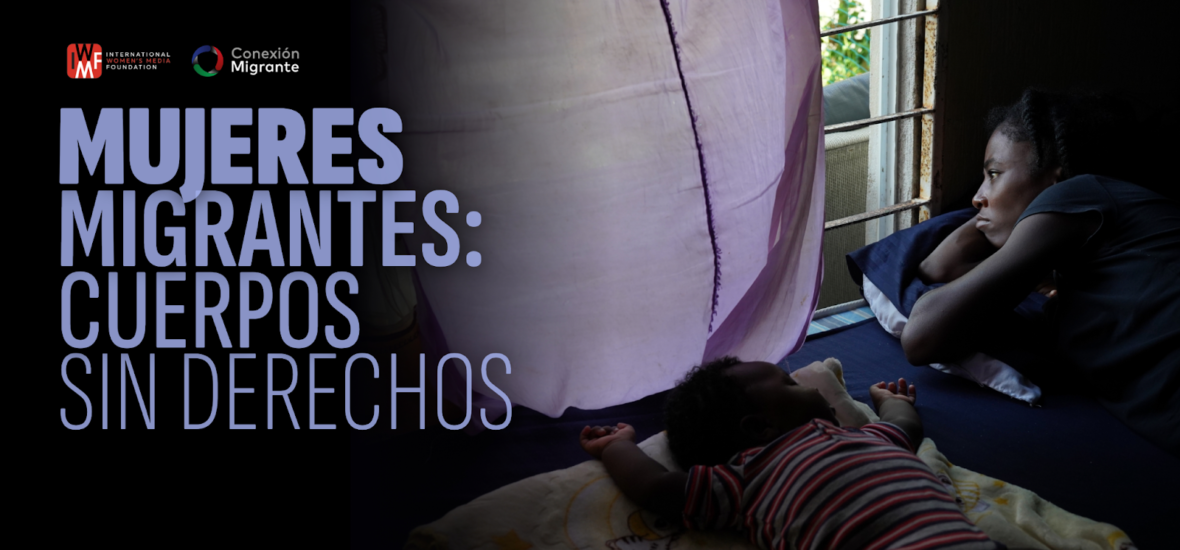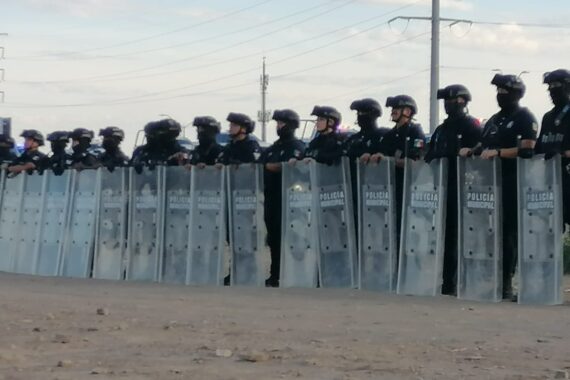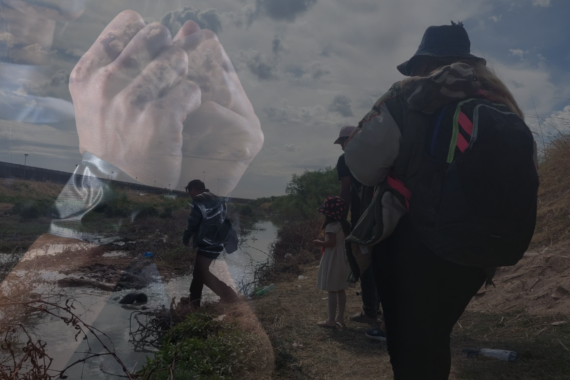Translated by Jesús Ronquillo / Circuito Frontera
Migrant women face a deadly journey in Mexico in their attempt to reach the United States with the threat of sexual abuse, forced pregnancy, fetal death and a high risk of death if they are pregnant. Testimonies collected in the field make it clear that, for them, migrating is almost a sentence.
In comparison with Mexican women living in the country, foreign women who are pregnant in Mexico are almost 20 times more likely not to achieve a pregnancy, according to their own calculations based on data from the National Institute of Statistics and Geography (INEGI), and face a high risk of maternal death.
For this research, migrant women were interviewed at different points along the migratory route that crosses Mexico from south to north. From the Suchiate River and Tapachula, in Chiapas, through Las Choapas and Coatzacoalcos, in Veracruz, to the two extremes of the northern border, in Tijuana and Reynosa, where they talk about how they face the lack of contraceptive methods, abortifacients and health services.
**This report was produced with the support of the International Women’s Media Foundation (IWMF) as part of its Reproductive Rights, Health and Justice in the Americas initiative**
Gelsy, a 19-year-old Honduran woman, sleeps on a shared mattress in a shelter in Tapachula, Chiapas, under a laminated roof from which streams of water escape. She is a mother but no longer wants to give birth. Her country prevented her from having surgery because she was under 21.
Click here for the Spanish versión
That is why, before starting her journey to the United States, she wants to buy an emergency pill to have an abortion if she is sexually assaulted, because migrating and suffering abuse, she says, is almost a certainty in Mexico.
-There are many things you hear… the girls on the road say that it is very risky, most of the women who have been raped tell of the experience.
Inside the Buen Pastor shelter in Tapachula, where Gelsy lives, the women watch the time pass, lying on the floor in front of a useless fan. They fan themselves with newspapers that only blow hot air, place wet rags around their necks and, as they do so, organize themselves to look for contraceptives or emergency pills before continuing on their way.

The condoms given to them by organizations and volunteers, the migrants say, are of no use to them in case they are raped or if their partner refuses to use them.
In the same shelter, another migrant, who preferred not to give her name, recalls that in Guatemala, before crossing the Suchiate River, which marks the border with Mexico, she was offered prostitution to pay for a hotel room. She had saved to leave Honduras, but the money ran out when she paid the pollero and he abandoned her.
-They told us that’s the only way they can get there, by prostituting themselves… because you need money,” she says with conviction.
For migrant women without a regulated stay in Mexico, having access to contraceptives is indispensable in their luggage because they know they are likely to be sexually abused or use their bodies in exchange for a man for a sense of security.
But access to sexual and reproductive health services is a right that is not guaranteed for the thousands of women who cross the country in vulnerable conditions due to their migratory status, according to the testimonies of migrants and organizations along the route from the southern border to the north of the country.
In its 2021 report, the Institute for Women in Migration (Imumi) reveals that seven out of every 10 women they attended experienced physical violence during their transit through Mexico; 83 percent psychological violence, 60 percent patrimonial violence, 42.5 percent economic violence and 18 percent sexual violence.
Pregnancies at risk
Not only are women who want to prevent pregnancies at risk, but also the lives of those who are already pregnant and are crossing the country in extreme weather conditions, with dehydration and without food.
One of the epicenters of the migratory route is the train station in Coatzacoalcos, Veracruz, where hundreds of migrants wait for the train to stop in order to board and head north. There, among the garbage, rats devour leftover food thrown a few steps away from where hundreds of people sleep on top of cardboard boxes on the ground, in temperatures of almost 40 degrees Celsius.
Among them is Jaime, a Honduran woman five months pregnant who, after leaving her country, has not seen a doctor.
She stopped at the train station where she met other migrants. Hardly anyone knows she is pregnant because her body is so thin that it barely allows a small bulge of her belly to peek out. She says she eats once a day, takes no vitamins and her body has been exposed to physical wear and tear. She thinks she and her child will survive because of God.

– I pray to God that everything is all right,” she says as she entrusts herself to her faith, and then explains that her baby has not moved, nor does she know if it is a girl or a boy, nor why her belly is so small, she has never had an ultrasound and, since she set foot in Mexico, she has not had a medical check-up.
The chances of her baby not being born are much higher for her than for a woman born in Mexico.
Compared to Mexican women living in the country, foreign women carrying a child in Mexico are 17.1 times more likely to fail to achieve a pregnancy, according to their own calculations based on data from the National Institute of Statistics and Geography (INEGI).
This figure was arrived at by comparing the proportion of fetal deaths in Mexican mothers, which was 1.98 percent in 2022, with that of fetal deaths in foreign women, which reached 34 percent that same year.Through the National Transparency System, information was requested from health institutions in the country’s 32 states on maternal deaths, perinatal deaths, prenatal care and births of foreign women registered from 2020 to July 2023, but only 12 responded with data.
Of these, seven states reported perinatal deaths (when it occurs after 22 weeks of gestation up to seven days after birth): Chihuahua, Coahuila, Jalisco, Tlaxcala, Nayarit, Veracruz and San Luis Potosí. In the latter state, one perinatal death was recorded, as well as 13 abortions to foreign women.
The information indicates that of the 51 perinatal deaths in foreign women registered from 2020 to July 2023, half occurred in Coahuila and Chihuahua. In addition, an upward trend is observed, since during the first seven months of 2023, nine fetal deaths were registered, very close to the 10 registered in all of 2022.
In relation to maternal deaths, Baja California registered half of the country’s cases reported through transparency, with five deaths between 2020 and 2023.
Of these, seven states reported perinatal deaths (when it occurs after 22 weeks of gestation up to seven days after birth): Chihuahua, Coahuila, Jalisco, Tlaxcala, Nayarit, Veracruz and San Luis Potosí. In the latter state, one perinatal death was recorded, as well as 13 abortions to foreign women.
The information indicates that of the 51 perinatal deaths in foreign women registered from 2020 to July 2023, half occurred in Coahuila and Chihuahua. In addition, an upward trend is observed, since during the first seven months of 2023, nine fetal deaths were registered, very close to the 10 registered in all of 2022.
In relation to maternal deaths, Baja California registered half of the country’s cases reported through transparency, with five deaths between 2020 and 2023

The presence of migrant women in Mexico has also multiplied in recent years. One indicator is the delivery of cards for humanitarian reasons granted by the Mexican government, which grew four times since 2020, when 10,763 documents were delivered and increased to 53,277 in 2022.
From January to July 2023 alone, 31,465 gestational pregnancy consultations were offered to foreigners in the country -regardless of their migratory status-, 76 percent of which were concentrated in just 10 states.
****
Mexico, a wall to migrant women’s health
Valeria Scalisse, head of the Psychosocial Accompaniment area of the civil organization Institute for Women in Migration (Imumi), warns that the lack of reproductive rights has to do with the government’s lack of will, but mainly with migration policies that are now more restrictive and force women to use routes with more risks and fewer services.
“It directly or indirectly influences women’s access to (health) services, I remember Venezuelan women commenting that they would rather go through the Darien (the jungle on the border between Colombia and Panama) twice than go through the Mexican routes; I thought it was very strong to hear that,” she says.
Crystal P. Lira, co-founder of the pro-abortion collective Las Bloodys, in Tijuana, explains that when it comes to residents of the region, they provide an average of 150 to 300 accompaniments per month, but in the case of migrants they only provide between one and five.

“Migrant women are more vulnerable and have less access to means to prevent or avoid an unwanted pregnancy due to the centralization of access and information, language, documentation, the various criminalizations due to their condition, as well as economic and housing inequality, it is not easy to migrate”, explains the activist.
Araceli Pineda, assistant director of Programs at ProSalud, a civil organization that promotes health and works with women in the context of mobility, maintains that migrants are at greater risk of not achieving a pregnancy.
“Sometimes they don’t know they are pregnant and when they have very strong pains, it is due to miscarriages, poor nutrition… due to their lack of access to bathrooms and hygiene”, said.
The specialist warns that the Mexican health system does not guarantee access to prenatal care or for the termination of pregnancy. The main barriers, she says, are the cultural beliefs of both migrants and those in charge of the institutions and organizations that surround them, such as the shelters where they arrive, which are mostly coordinated by religious communities.
Prepared to migrate
Devora, a salvadoran migrant who was sexually assaulted in her country, became pregnant and tried to terminate the pregnancy with emergency pills, but the medication did not work. Nearly six months pregnant, in April 2023 she decided to migrate alone to the United States.
She arrived at the eastern border of Mexico and the United States, in the city of Reynosa, where when the sun rises it burns the skin. As soon as night falls, businesses lower their curtains and families hide inside their homes, as if sequestered within their own four walls, and from there, they learn to live amidst the sound of bullets that ring out almost daily.

Devora took refuge in Casa Lulu, one of the few shelters in the city that receives migrant victims of torture and sexual abuse, where she told her story and despite her desire not to be a mother, she was assured that children are a blessing and that those who are not yet born are not to blame for her aggression.
Resigned to a forced pregnancy, she thinks that the only thing she was afraid of was being murdered or disappearing along the way, because she was not afraid of another abuse.
-I did know that it could happen (rape) but it is a risk one takes… I didn’t feel fear as a woman that I might lose something.
Mexico’s Migration Law obliges the State to guarantee health services regardless of migratory status and there are international agreements that demand respect for the reproductive rights and sexual health of migrant women -including abortion-. But in this country, quality medical care is the exception rather than the norm.
Before starting their journey, many migrant women inject themselves with contraceptives that last for three months to avoid unwanted pregnancies, but when they are detained at the border, the effect wears off before they start their journey. From the shelters and during their transit they look for where to buy the injection, but the cost and lack of access make it inaccessible.
Escarleth, a 22-year-old Honduran woman, has been unsuccessful in purchasing her injection. Suspecting an unplanned pregnancy, she searches among organizations and volunteers for someone to help her with contraceptives for women. Her partner refuses to use a condom.
People who have come, volunteers, have left condoms and you take them… but there are people who use them to play with. What do I do with them?
Report replicated with authorization from Conexión Migrante
TEAM
Project Manager
Patricia Mercado Sánchez
Editing:
Nadia Sanders
Research:
Gabriela Martínez
Photos and Videos:
Alicia Fernández
Digital Design:
Jhasua Razo
Administration:
Sofía Montellano










